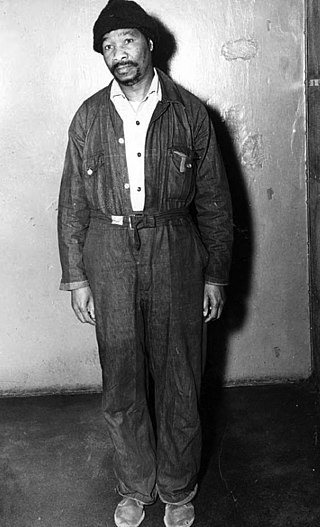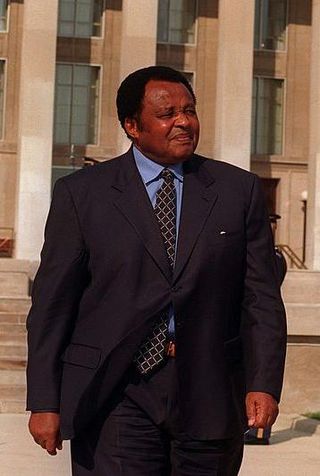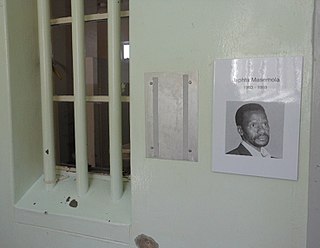Related Research Articles

Walter Max Ulyate Sisulu was a South African anti-apartheid activist and member of the African National Congress (ANC). Between terms as ANC Secretary-General (1949–1954) and ANC Deputy President (1991–1994), he was Accused No.2 in the Rivonia Trial and was incarcerated on Robben Island where he served more than 25 years' imprisonment for his anti-Apartheid revolutionary activism. He had a close partnership with Oliver Tambo and Nelson Mandela, with whom he played a key role in organising the 1952 Defiance Campaign and the establishment of the ANC Youth League and Umkhonto we Sizwe. He was also on the Central Committee of the South African Communist Party.
The Rivonia Trial is a trial that took place in apartheid-era South Africa between 9 October 1963 and 12 June 1964, after a group of anti-apartheid activists were arrested on Liliesleaf Farm in Rivonia. The farm had been the secret location for meetings of uMkhonto we Sizwe (MK), the newly-formed armed wing of the African National Congress. The trial took place in Pretoria at the Palace of Justice and the Old Synagogue and led to the imprisonment of Nelson Mandela, Walter Sisulu, Govan Mbeki, Ahmed Kathrada, Denis Goldberg, Raymond Mhlaba, Elias Motsoaledi, Andrew Mlangeni. Many were convicted of sabotage and sentenced to life.

Govan Archibald Mvunyelwa Mbeki was a South African politician, military commander, Communist leader who served as the Secretary of Umkhonto we Sizwe, at its inception in 1961. He was also the son of Chief Sikelewu Mbeki and Johanna Mahala and also the father of the former South African president Thabo Mbeki and political economist Moeletsi Mbeki. He was a leader of the South African Communist Party and the African National Congress. After the Rivonia Trial, he was imprisoned (1963–1987) on charges of terrorism and treason, together with Nelson Mandela, Walter Sisulu, Raymond Mhlaba, Ahmed Kathrada and other eminent ANC leaders, for their role in the ANC's armed wing, Umkhonto we Sizwe (MK). He was sometimes mentioned by his nickname "Oom Gov".
Raymond Mphakamisi Mhlaba OMSG was an anti-apartheid activist, Communist and leader of the African National Congress (ANC) also as well the first premier of the Eastern Cape. Mhlaba spent 25 years of his life in prison. Well known for being sentenced, along with Nelson Mandela, Govan Mbeki, Walter Sisulu and others in the Rivonia Trial, he was an active member of the ANC and the South African Communist Party (SACP) all his adult life. His kindly manner brought him the nickname "Oom Ray".

Ahmed Mohamed Kathrada OMSG, sometimes known by the nickname "Kathy", was a South African politician and anti-apartheid activist.
The following lists events that happened during 1964 in South Africa.
Elias Mathope Motsoaledi OMSG was a South African anti-apartheid activist. He was Accused No.9 in the Rivonia Trial and was sentenced to life imprisonment in July 1963 with a group of anti-Apartheid revolutionaries which included Nelson Mandela who was Accused No.1.

Johannes "Joe" Modise was a South African political figure. He helped to found uMkhonto we Sizwe, the military wing of the African National Congress, and was its longest serving Commander in Chief, deputised at different points in time by Joe Slovo and Chris Hani. Modise headed MK for a 25-year period, from 1965 to 1990. He served as South Africa's first black Minister of Defence from 1994 to 1999 and led the formation of the post-independence defence force.

Sathyandranath Ragunanan "Mac" Maharaj OLS is a retired South African politician, businessman, and former anti-apartheid activist. A member of the African National Congress (ANC), he was the first post-apartheid Minister of Transport from 1994 to 1999. He was later the official spokesperson to the President of South Africa, Jacob Zuma.
Zephania Lekoame Mothopeng was a South African political activist and member of the Pan-Africanist Congress (PAC).
The Little Rivonia Trial was a South African apartheid-era court case in which several members of the armed resistance organization Umkhonto we Sizwe faced charges of sabotage. The accused were: Laloo Chiba, Dave Kitson, Mac Maharaj, John Matthews and Wilton Mkwayi. A confederate of theirs, Lionel Gay turned state witness, and in return, the prosecution dropped the charges against him.

Liliesleaf Farm, also spelt Lilliesleaf and also known simply as Liliesleaf, is a location in northern Johannesburg, South Africa, which is most noted for its use as a safe house for African National Congress (ANC) activists during the apartheid years in the 1960s. In 1963, the South African police raided the farm, arresting more than a dozen ANC leaders and activists, who were then tried and prosecuted during the Rivonia Trial.
Amina Cachalia, OLB was a South African anti-Apartheid activist, women's rights activist, and politician. She was a longtime friend and ally of former President Nelson Mandela. Her late husband was political activist Yusuf Cachalia.

Ismail Ahmed Cachalia (1908-2003), popularly known as Moulvi, was a South African political activist and a leader of Transvaal Indian Congress and the African National Congress. He was one of the leaders of the Indian Passive Resistance Campaign of 1946 and the Defiance Campaign in 1952. The Government of India awarded the fourth highest Indian civilian honour of Padma Shri in 1977.
The following lists events that happened during 2017 in South Africa.

Wilton Zimasile Mkwayi OMSG was an African National Congress veteran and one of the first six members of Umkonto weSizwe to be sent for military training.

Jafta Kgalabi Masemola OLS, also known as The Tiger of Azania and Bra Jeff, was a South African anti-apartheid activist, teacher, and founder of the armed wing of the Pan Africanist Congress (PAC). He spent 27 years in South African prison during the apartheid era in South Africa, and was released in October 1989, shortly before the legalization of the PAC and the African National Congress by F. W. de Klerk. He served the longest sentence of any political prisoner in Robben Island prison in South Africa.

Robben Island Prison is an inactive prison on Robben Island in Table Bay, 6.9 kilometers (4.3 mi) west of the coast of Bloubergstrand, Cape Town, South Africa. Nobel Laureate and former President of South Africa Nelson Mandela was imprisoned there for 18 of the 27 years he served behind bars before the fall of apartheid. Since then, three former inmates of the prison have gone on to become President of South Africa.

Ebrahim Ismail Ebrahim OLG was a South African anti-apartheid activist of Indian origin who was a member of the African National Congress's armed wing uMkhonto we Sizwe. He was tried in the Pietermaritzburg sabotage trials of 1963 and was sentenced to a 15-year imprisonment at the Robben Island Maximum Security Prison.
Peter Mampogoane Nchabeleng was a South African trade unionist and anti-apartheid activist who died in police detention in the Lebowa bantustan in April 1986. At the time of his death, he was the inaugural chairperson of the United Democratic Front in the Northern Transvaal and head of the underground African National Congress (ANC) in the same region.
References
- ↑ O'Malley, Padraig (2007). Shades of difference. Mac Maharaj and the struggle for South Africa . New York: Viking. pp. 137–146.
- 1 2 3 4 5 6 7 8 9 "Gauteng premier mourns 'compassionate comrade' Laloo Chibadate". IOL News. 8 December 2017. Retrieved 3 May 2019.
- 1 2 3 4 5 6 7 8 "Laloo Chiba (1930 - )". The Presidency: Republic of South Africa. Retrieved 3 May 2019.
- 1 2 Gerber, Jan (8 December 2017). "Struggle stalwart Laloo Chiba dies". News24. Retrieved 2 May 2019.